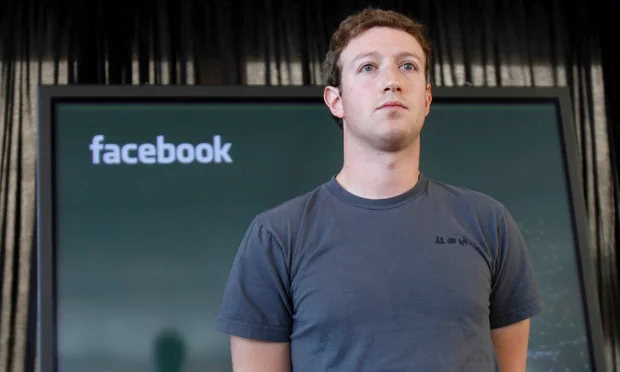For over a decade, Mark Zuckerberg has been the face of a tech empire. The Facebook co-founder and CEO has been widely perceived as an aloof, hoodie-wearing “AI” – an ultra-wealthy but deeply unpopular figure who has presided over one privacy scandal after another.
From the Cambridge Analytica debacle to accusations that the platform was enabling genocide and social unrest in other countries, Zuckerberg’s tenure at the helm of Facebook has become mired in controversy and mistrust. As he testified before Congress amid the company’s mounting crises, the public’s view of Zuckerberg hardened – he was seen as an unethical, anti-human figure who prioritized profits over privacy and the wellbeing of his users.

Yet in the span of just a few short years, Zuckerberg has undergone a dramatic personal transformation. Gone are the casual grey t-shirts and jeans, replaced by expensive jewelry, aviator sunglasses, and a head of curly hair more befitting an action movie star than a tech CEO. Zuckerberg has become an MMA fighter, a jiu-jitsu competitor, and an adventure-seeking thrill-seeker – a far cry from the nerdy programmer who built one of the world’s most influential social media platforms.


The reason for Zuckerberg’s remarkable metamorphosis is no mystery. As the company he founded, now known as Meta, has faced a mounting tide of criticism and skepticism, its CEO has embarked on an ambitious mission to rebrand himself – and by extension, the company he leads. The success or failure of this personal reinvention may very well determine the fate of the tech giant’s grand vision for the “metaverse.”

The connection between a CEO’s personal brand and the corporate brand they represent is a powerful one. When a leader is perceived as untrustworthy, unethical, or out-of-touch, it inevitably colors the public’s view of the company they helm. Conversely, a charismatic, authentic, and admirable CEO can be a powerful asset in bolstering a company’s image and goodwill.
This is a lesson that Zuckerberg has learned the hard way. After years of scandal and controversy, the Facebook founder has come to understand that he can no longer rely on the success of his company alone to secure his legacy. Instead, he has set out to completely redefine his own public persona – transforming himself from a socially awkward tech mogul into a rugged, adventurous, and physically fit man of the people.
The logic behind this personal rebrand is clear. If Zuckerberg can change the perception of himself as an aloof, unethical “AI” to a more relatable, active, and likable individual, he can in turn reshape the tarnished reputation of the company he leads. It’s a high-stakes gambit, to be sure, but one that speaks to the immense power of personal branding in the modern business landscape.

Of course, overhauling a deeply entrenched public perception is no easy feat. Zuckerberg’s past missteps have left a lasting stain, and the skepticism surrounding both him and his company runs deep. The Facebook founder’s dramatic physical transformation – complete with MMA training videos and jiu-jitsu tournament appearances – may strike some as little more than a cynical publicity ploy.
But there is a deeper strategy at work here. By positioning himself as an adventurous, physically fit alpha male, Zuckerberg is appealing to a certain archetype of modern masculinity that holds immense sway in our culture. He is attempting to recast himself as a bold, risk-taking visionary – the kind of leader who can boldly guide his company into the uncharted territory of the “metaverse.”
This transition from social media platform to virtual reality behemoth is undoubtedly the greatest challenge Zuckerberg has faced in his career. After years of scandals and mistrust, the Facebook rebrand to Meta has so far failed to capture the public’s imagination.

In this context, Zuckerberg’s personal rebranding efforts take on an even greater significance. By humanizing himself and cultivating an image of rugged, adventurous leadership, the CEO is clearly hoping to regain public trust and excitement around Meta’s ambitious plans. If he can reshape perceptions of himself, the thinking goes, he can in turn reshape perceptions of the company he leads.
The lesson is clear: in the modern business landscape, a CEO’s personal brand can make or break the corporate brand they lead. Companies ignore this connection at their own peril. Zuckerberg’s dramatic transformation is a high-stakes gamble, to be sure – but it speaks to the immense power of personal branding in shaping both individual and institutional reputations.

As Meta continues its quest to dominate the next frontier of the digital world, all eyes will be on its CEO. Can Mark Zuckerberg’s personal reinvention help to rehabilitate the company’s battered image? Or will his efforts to humanize himself and his brand fall short in the face of deep-seated public mistrust? The fate of the metaverse may well hang in the balance.
Read more:
- Best Before Opens New Centurion Store, Challenging Pick n Pay and Checkers with Low Prices

- Local Shops Outpaced Supermarkets as Consumers Flocked to Spazas and Taverns

- Mirinda Welcomes Red Apple and Raspberry to the Family

- Kroger to close dozens of unprofitable stores in strategic restructuring

- Vendors defy ban on second-hand goods as government pushes formalization







